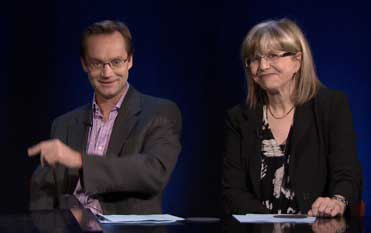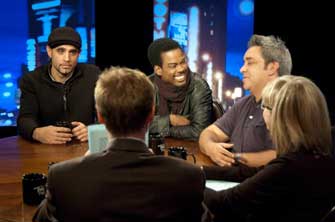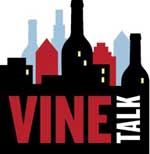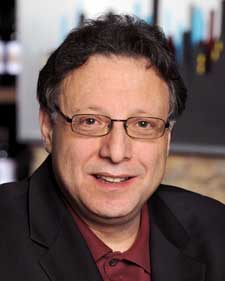July 27, 2011 11:26 AM
By Tom Brinkmoeller
When gems are graded, weight isn't the only criterion. Cut and color matter a lot, too. Emmy nominators made "gem judgments" of TV's best recently, with Nielsen points, as always, the equivalent of carat weight. Submitted for your approval: Two delightful TV gems that don't pull the ratings of the Emmy-nominated productions, but still have a cut and clarity that make them valuable -- and worth knowing about: Theater Talk and Vine Talk...
Each is a public-television series that isn't distributed nationally by PBS, which means stations choose if and when to run them. People interested in watching may have to search local schedules, but the two series are well worth the hunt. One regularly features the best creative forces of New York theater; the other attracts fascinating guests who have fun demystifying the often-unfathomable world of wine.
Theater Talk

Imagine a talk show co-hosted by the witty and cerebral newswoman Linda Ellerbee and the shrill-talking, rock-throwing, shotgun-packing Ernest T. Bass from The Andy Griffith Show. That is a pretty close characterization of Theater Talk hosts Susan Haskins and Michael Riedel.
The former is the producer, polite and knowledgable; the latter, also a theater critic for the New York Post, keeps his social graces in a safe-deposit box, and does everything he can to make the host position a solo job by claiming squatter's rights to nearly every breathed word of host dialogue.
Neil Simon fans might find it appropriate that an odd couple would cover Broadway. Even so, the formula works, despite its weird chemistry. It works because Haskins and Riedel have been doing it since 1993, and it also works because this small-budget, almost-clandestine show books first-class guests who want to be there.
For anyone interested in theater, but separated from it by distance and/or budget, this is the perfect vicarious orchestra-seat view of what's news and why.
In a recent interview for TVWW, Haskins told how she and Riedel met while guesting on a New York City theater talk show in the early '90s, "hit it off and decided we wanted to try our own, more newsy, access show." Their earliest shows were done in the city's public-access studios; now they are produced in the studios of the City University of New York (CUNY).
A large dose of credibility and viewer accessibility blossomed when New York public station WNET began carrying the series in late 1996. Theater Talk also extended its reach when it started being distributed nationally as an a la carte item by Executive Program Services, which estimates the program now is available in 52 percent of all U.S. homes.
Guests include legends: Elaine Stritch has been there several times; Neil Simon was on the show in the late '90s; artist Al Hirschfield, whose drawings were a staple of Broadway coverage and productions, invited the show to his brownstone home studio about a year before his 2003 death. The stars and producers of the reigning Tony Award-winning The Book of Mormon happily have appeared. A currently running two-parter features composer Alan Menken in a song-and-talk visit set around a grand piano.

Hostile guests also show up. The Mother------ with the Hat actors Chris Rock and Bobby Cannavale visited along with the show's author, Stephen Adly Guirgis. In his column, Reidel had written some negative things about Guirgis's state of mind, Haskins said -- accusations the guests said were false and unfounded. And though Guirgis and Rock kidded around the issue, Cannavale was openly annoyed and confrontational.
"He was kind of mad at Michael for picking on his friend," Haskins said.
Guests that she would love to book but who probably won't show, because of things Riedel has written about them, include Stephen Sondheim and Nathan Lane, Haskins said. Another probable non-guest, she added, is former Spiderman director Julie Taymor. Riedel criticized her incessantly in print and on the air for the many problems the production encountered before it opened. Though Taymor and Riedel were friendly before that, Haskins assumes she would decline an invitation now because her co-host "is an equal-opportunity destroyer" who puts news coverage and commentary ahead of relationships.
Haskins also has problems, she admitted, with the way Riedel commandeers the shows, but edits out most of the footage showing it so viewers don't have to witness "fighting in front of company."
In the early days of the show, when they took calls from viewers, a woman phoned to say, "I see an abuse situation here," Haskins recalled. She calls him "the little brother I never had," and says they "have terrible fights" and she is "furious at him half the time." That doesn't stop her from acknowledging what she calls his remarkable newspaper skills and the "notoriety" of his position in helping book guests.
Even though it's unlikely they'll declare each other BFFs, their on-air efforts result in a series that has attracted many loyal fans and credibility within the New York theater community. Those are sizable accomplishments for a series that Haskins said "operates on a dime."
Vine Talk

Aside from sharing the word "talk" in their titles and space on the schedules of public-television stations, these two series share little else. Vine Talk has underwriters (and as a result a more substantial budget), is shot within high-rent confines (WNET's Lincoln Center studios) and, at the end of its premiere season, already is a runaway hit, on 250 public stations in 47 states and growing.
When asked if such a quick start had been expected, Bruce Marcus, the program's creator and executive producer, said, "Honest answer -- No." But a near-perfect mix of elements and a market niche that wasn't being served, Marcus said in a recent interview, moved the show above the crowd quickly.

The elements: Out of a large field of wines in a specific category, a screening panel selects six as outstanding; a few celebrity guests (including someone with food and/or restaurant connections) are invited to blind-taste the six; series co-hosts, actor Stanley Tucci and Food & Wine magazine Executive Wine Editor Ray Isle, talk with the guests about the wines, as well as their careers and other fun topics throughout the sampling. At the end of 30 minutes, Isle reveals the top choice of the special guests, as well as that of small studio audience.
The format works perfectly. It's difficult to pick what's better: The relaxed conversations among an always-interesting cross-section of special guests, or the conclusions they come to about the wines -- interesting because most of the celebrity guests aren't wine experts and cast their votes based on personal taste. As with many of the best public-TV shows, the enjoyment is more in the watching the process than in any momentous conclusion.
"This show is really good because it's so simple," Marcus said. "You get a bunch of celebrities together, get them drinking wine, and what can go wrong?" It's a long way from how Marcus describes previous TV wine shows: "Classic wine experts prancing though the fields of France -- they're beautiful, but no one watches."

Lining up Tucci, Isle and WNET -- "Players who would, typically, never come in on your average project" -- bettered the program's chances, he said. "For a first-run (public-TV) show that didn't begin in Europe, we've never seen something like this."
Isle said he was "definitely intrigued" when Marcus "called me out of the blue in my office" and pitched the idea. (Isle said Marcus' opening line was, "Don't hang up on me yet.") "As soon as he explained it to me, I thought it was pretty cool." The program "defuses the pretension" that often surrounds wine, and that's always been a goal of his when writing and talking about the subject, he said.
Lining up guests hasn't been a problem; Tucci knows many of the show-business guests and Isle's food and restaurant connections also help. The pool isn't likely to dry up: Marcus said he gets calls from publicists almost daily, offering their clients for spots on the show.
In its second season, about one-third of the episodes will be shot in Los Angeles, opening up the guest possibilities even more. Since Tucci won't be able to host all the second-season programs, because of commitments to other acting projects, Marcus now is in negotiations with another person to team with Isle for those shows. He won't reveal who that person is until a contract is signed.
With the momentum it already has, it should make it relatively easy to land a worthy understudy for Tucci.